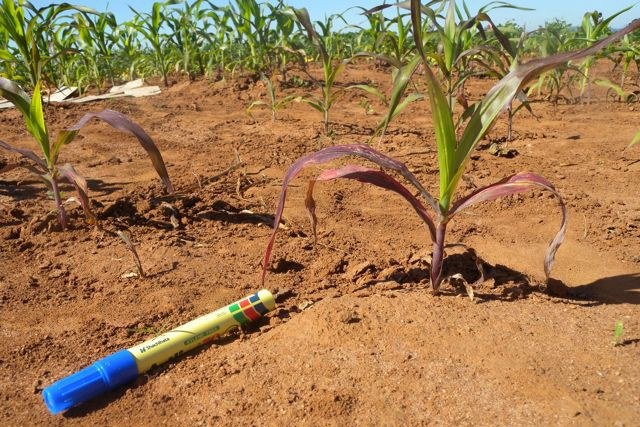Development of the Ukulima Root Biology Center as a research platform for generation of new crop varieties and cropping systems adapted to the stressful soils of eastern and southern Africa.

Maize plants exhibiting phosphorus stress
Project leader: Jonathan Lynch Penn State
Project participants:
Stephen Beebe CIAT
Kathleen Brown Penn State
Magalhaes Miguel IIAM
Shawn Kaeppler University of Wisconsin
Juan Carlos Rosas Zamorano
Soares Xerinda IIAM
Overall Objectives
Develop the Ukulima Root Biology Center as a research platform for:
1. Testing and evaluation of maize varieties for tolerance to drought and low soil N availability
2. Discovery of parent lines and genetic markers for genes controlling root traits for superior soil stress tolerance in maize
3. Testing and evaluation of common bean varieties for tolerance to drought and low soil N availability, and low soil P availability (if low P is possible in year one)
4. Testing and evaluation of integrated crop management systems combining stress-tolerant genotypes and soil conservation to enhance productivity and fertility using local inputs
5. Regional collaboration among agricultural researchers
Summary
A significant proportion of annual yield is lost due to suboptimal water and nutrient availability. Root architecture is an important trait for nutrient and water acquisition. Water and nutrient acquisition could be improved by selection of genotypes with efficient soil exploration.
The overall objective of this project is to i) evaluate the utility and tradeoffs of root traits for tolerance to low nitrogen, low phosphorus (only beans) and drought stress in maize and bean varieties and ii) to identify the genetic basis of these traits. For this purpose a genetically broad set of 1000 maize and bean lines will be evaluated under conditions with varying nutrient availability. Root traits responsible for the performance of superior genotypes will be identified. The identified root traits can subsequently be used to identify and select genotypes well adapted to environments with low nutrient status and drought.
In a second step the genetic basis of root traits conferring tolerance to low N, low P and drought will be evaluated. Quantitative trait loci (QTL) will be identified by means of nested association mapping for maize and linkage mapping for beans. Identified QTLs and candidate genes will subsequently be available for the application in breeding. Thereby crop yield, in marginal environments with low N and water availability, could be increased entailing improvements in food security.
Upon identification of strong QTLs/ candidate genes we aim to improve elite germplasm by marker introgression of strong QTLs/ candidate genes. Results will be disseminated by means of collaboration with regional agricultural researchers.
This project is made possible with generous support from the Howard G. Buffett Foundation, which advocates for the design and adoption of appropriate farming systems that increase yield while addressing soil health, water quality, and a reduced environmental footprint.

